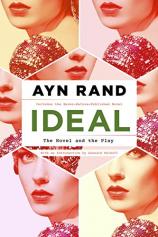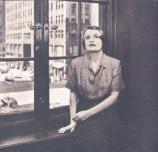Ideal
Review
Ideal
It's hard to imagine that the writer of THE FOUNTAINHEAD and ATLAS SHRUGGED ever suffered a moment of insecurity or doubt about her writing. Yet this is exactly what happened when Ayn Rand, in her early 20s, wrote IDEAL. She was not satisfied with the novel and rewrote it as a play. Neither one met her standards, so the manuscripts were put aside. Today, fans and followers have the opportunity to read a “new” work and gain more insight into the iconic woman they have admired over the years.
It is obvious from the format of both the novel and the play that Rand was writing more than an adventure or a mystery. A beautiful movie star who is suspected of murder and trying to hide from authorities until the real killer is found merely provides the frame around the picture. The characters Rand draws are familiar types, exemplifying various degrees of her “anti-ideals.” These are the people who disappoint, wound, and betray even their own ideals. As Kay Gonda visits each of the “types,” Rand takes the opportunity to demonstrate their weaknesses and flaws.
"For anyone who has not had the pleasure of reading an Ayn Rand novel, IDEAL is a great place to start. Despite her age and lack of life experience when she wrote it, her style and riveting characters foreshadow her later works."
Each has written a reverent fan letter to Kay Gonda, the ethereal, mysterious star of motion pictures, adoring her as an ideal who speaks directly to their very soul. Even though each has promised to do whatever she wanted or needed, not one of them is willing to help her when she comes to them in dire need. Her overwhelming despair about mankind is painfully reinforced. One after another, her devoted fans succumb to the evil that she associates with betraying one's ideals. This theme is carried through her most successful novels. Heroes and villains alike are larger than life --- supernaturally good or preternaturally evil.
One of the most difficult-to-understand aspects of Rand's philosophy is the disconnect between her passion and her lack of emotion. As with “worst fears realized,” her heroic characters accept their pain as though it were expected, stoically continuing whatever quest they are on, hoping to find a kindred spirit somewhere on the planet.
As a converted Objectivist, one who has successfully completed her search for the “ideal,” I now have a better understanding of Rand's quest for the best. She created in fiction what she could not find in reality. Ironically, the illusive ideal that she sought was to be found in the Creator, not in his creation. While believers have always fallen short of perfection, the ideals they seek to emulate are found not in fiction but in the Bible. I believe that the ethics outlined by God in the Old Testament and lived out by Christ in the New Testament provide the ideal that Rand sought.
Of course, this theory of mine will not resonate well with those followers of Objectivism who are still seeking the ideal through politics and philosophies. Many are avowed atheists and refuse to consider any connection between religion and good. Unfortunately, this blind spot will prevent them from finding the ideals they seek.
For anyone who has not had the pleasure of reading an Ayn Rand novel, IDEAL is a great place to start. Despite her age and lack of life experience when she wrote it, her style and riveting characters foreshadow her later works.
Reviewed by Maggie Harding on July 31, 2015
Ideal
- Publication Date: July 7, 2015
- Genres: Fiction
- Hardcover: 256 pages
- Publisher: NAL
- ISBN-10: 0451475550
- ISBN-13: 9780451475558




